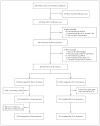A randomized trial of tai chi for fibromyalgia
- PMID: 20818876
- PMCID: PMC3023168
- DOI: 10.1056/NEJMoa0912611
A randomized trial of tai chi for fibromyalgia
Abstract
Background: Previous research has suggested that tai chi offers a therapeutic benefit in patients with fibromyalgia.
Methods: We conducted a single-blind, randomized trial of classic Yang-style tai chi as compared with a control intervention consisting of wellness education and stretching for the treatment of fibromyalgia (defined by American College of Rheumatology 1990 criteria). Sessions lasted 60 minutes each and took place twice a week for 12 weeks for each of the study groups. The primary end point was a change in the Fibromyalgia Impact Questionnaire (FIQ) score (ranging from 0 to 100, with higher scores indicating more severe symptoms) at the end of 12 weeks. Secondary end points included summary scores on the physical and mental components of the Medical Outcomes Study 36-Item Short-Form Health Survey (SF-36). All assessments were repeated at 24 weeks to test the durability of the response.
Results: Of the 66 randomly assigned patients, the 33 in the tai chi group had clinically important improvements in the FIQ total score and quality of life. Mean (+/-SD) baseline and 12-week FIQ scores for the tai chi group were 62.9+/-15.5 and 35.1+/-18.8, respectively, versus 68.0+/-11 and 58.6+/-17.6, respectively, for the control group (change from baseline in the tai chi group vs. change from baseline in the control group, -18.4 points; P<0.001). The corresponding SF-36 physical-component scores were 28.5+/-8.4 and 37.0+/-10.5 for the tai chi group versus 28.0+/-7.8 and 29.4+/-7.4 for the control group (between-group difference, 7.1 points; P=0.001), and the mental-component scores were 42.6+/-12.2 and 50.3+/-10.2 for the tai chi group versus 37.8+/-10.5 and 39.4+/-11.9 for the control group (between-group difference, 6.1 points; P=0.03). Improvements were maintained at 24 weeks (between-group difference in the FIQ score, -18.3 points; P<0.001). No adverse events were observed.
Conclusions: Tai chi may be a useful treatment for fibromyalgia and merits long-term study in larger study populations. (Funded by the National Center for Complementary and Alternative Medicine and others; ClinicalTrials.gov number, NCT00515008.)
Figures



Comment in
-
Prescribing tai chi for fibromyalgia--are we there yet?N Engl J Med. 2010 Aug 19;363(8):783-4. doi: 10.1056/NEJMe1006315. N Engl J Med. 2010. PMID: 20818882 No abstract available.
-
A randomized trial of tai chi for fibromyalgia.N Engl J Med. 2010 Dec 2;363(23):2266; author reply 2266-7. doi: 10.1056/NEJMc1010478. N Engl J Med. 2010. PMID: 21121849 No abstract available.
-
A randomized trial of tai chi for fibromyalgia.N Engl J Med. 2010 Dec 2;363(23):2265-6; author reply 2266-7. doi: 10.1056/NEJMc1010478. N Engl J Med. 2010. PMID: 21121850 No abstract available.
-
A randomized trial of tai chi for fibromyalgia.N Engl J Med. 2010 Dec 2;363(23):2265; author reply 2266-7. doi: 10.1056/NEJMc1010478. N Engl J Med. 2010. PMID: 21121851 No abstract available.
References
-
- Wolfe F, Ross K, Anderson J, Russell IJ, Hebert L. The prevalence and characteristics of fibromyalgia in the general population. Arthritis Rheum. 1995;38:19–28. - PubMed
-
- Wolfe F, Anderson J, Harkness D, et al. A prospective, longitudinal, multicenter study of service utilization and costs in fibromyalgia. Arthritis Rheum. 1997;40:1560–70. - PubMed
-
- Carville SF, Arendt-Nielsen S, Bliddal H, et al. EULAR evidence-based recommendations for the management of fibromyalgia syndrome. Ann Rheum Dis. 2008;67:536–41. - PubMed
-
- Burckhardt CS, Goldenberg D, Crofford L, et al. Guideline for the management of fibromyalgia syndrome: pain in adults and children. Glenview, IL: American Pain Society; 2005.
-
- Burckhardt CS. Multidisciplinary approaches for management of fibromyalgia. Curr Pharm Des. 2006;12:59–66. - PubMed
Publication types
MeSH terms
Associated data
Grants and funding
LinkOut - more resources
Full Text Sources
Medical
